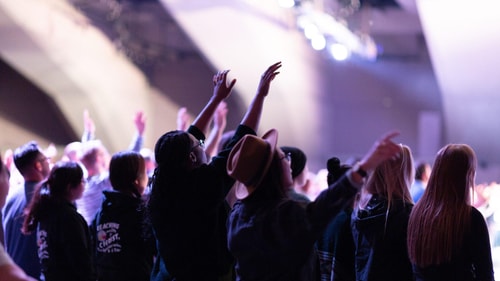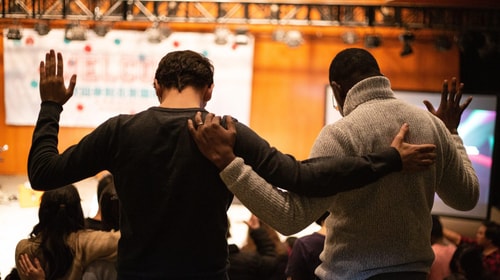Intercultural worship is not simply cultural diversity in song – it goes deeper. It is the voice of a church where each believer can express their worship on level ground and where no culture is exalted above another, even if there is a cultural majority.
Here, Jesus-followers of all ethnicities don’t have to ‘fit in’ and leave their heritage at the door. This is a space where they know they are “no longer foreigners and strangers, but fellow citizens with God’s people” (Ephesians 2:19). They are accepted as equals (Galatians 3:28). In such worship, we get to express our voices, but we also learn to “please our neighbours for their good, to build them up” and this concern for others is worship too; it brings God praise (Romans 15:2 and 15:7).
My journey towards intercultural worship
My journey into intercultural worship began in mid-2002, in Oldham, Manchester. By 2007, God had brought to our white majority church Christians and enquirers from 11 different countries. The first, a Sierra-Leonean djembe player, who added his own sound to our English songs. Soon after, the pastor invited him to teach the congregation songs from his homeland.
East Africans taught us to dance to Swahili praise songs. Persians introduced us to poetic worship. In six years, the church moved from monocultural to intercultural worship. This shift caught the attention of the local newspaper, who described us as a “mini united nations” – a striking phrase, since in 2001, Oldham was dubbed “capital of racial tension”.
Worship arose from loving relationships and a desire to involve, not exclude. I now live in Leeds and my local church is in the early stages of a similar journey.
How can we worship in greater unity?
From 2020, I’ve observed a growing openness to embrace multilingual and multi-ethnic worship, not only by white majority churches but also African, Chinese and South Asian congregations. This reflects an awareness that no culture has it all and, like different parts of the body, we desperately need what others contribute (1 Corinthians 12:21). The increasing cultural diversity of the UK church presents us with an opportunity to be imaginative – the time for intercultural worship has come! These words of Jesus ring in my ears:
“…a time is coming and has now come when the true worshippers will worship the Father in the Spirit and in truth, for they are the kind of worshippers the Father seeks.” (John 4:23).
If worship in the Spirit and in truth includes every worshipper being permitted to worship in ways that free them to worship in heart, soul, mind and strength, this also means “loving our neighbour as ourselves” (Mark 12:30 – 31), in the language and song choices we make on a Sunday. And how will we know what these might be? The answer is simple: conversing well and actively listening to the hearts of our brothers and sisters.
You may ask, how can so many worship cultures join together in worship? Good question – but it is not difficult to incorporate some multilingual songs, Bible readings, and prayers. Then, over time, something beautiful can emerge – the church’s own sounds and expressions – enabled by the Holy Spirit, just as Ezekiel’s dry bones came to life and divided nations came together (Ezekiel 37:10, 22).
By moving forward in this way, we are creating a better legacy – increased cross-cultural and intergenerational collaborations between songwriters, worship leaders and designers of worship services. Musically, this is already happening, whether in:
- ethnically ‘seasoned’ arrangements of Elevation’s 2020 song ‘The Blessing’;
- the 2020 global version of the Igbo song, ‘Nara Ekele Mo’ by Resonance;
- the production of ‘Rise up and Serve’ for the Queen’s 2022 Platinum Jubilee; or
- by the East-West fusion of Sheldon Bangeera, also covered by Selah.
Additionally, multilingual, multi-style songs are increasingly available on the websites and YouTube channels of Arts Release and Songs2Serve. These ministries also run hands-on intercultural worship workshops.

Overcoming objections to intercultural worship
Objections to intercultural worship come in two forms. The first is the “I don’t know how to” category, regarding practicalities of songs in multiple languages and styles. These can be overcome through choosing appropriate and accessible songs, not rushing the process, providing singable English versions of songs, using short sections in other languages, and maximising the languages and musical skills of congregation members.
Other objections fall under the “I don’t want to” category. This is where biblical teaching about God’s heart for unity, diversity and equality is vital. Such teaching must also include a recognition of anti-biblical, cultural attitudes, such as the West’s idolatry of individual satisfaction, even in worship, whereas Paul instructs us to “please our neighbours for their good, to build them up”. Intercultural worship, then, becomes counter-cultural – a potent demonstration of God’s multi-coloured wisdom (Ephesians 3:10)!
Such worship can be profoundly transformative, discipling us to become like Christ in our acceptance of those who are culturally or generationally different. For example, one of our Resonance band members testified to God rooting out of her heart engrained racist attitudes towards a people group her own people have hated for centuries. It was in worship, singing a beautiful song from that “despised” nation, that God set her free (2 Corinthians 10:4 – 5). May God use intercultural worship to root out all such prejudice and build unity in our churches as a testimony to Jesus in our nation (John 17:23).
Further resources
Interested church and worship leaders can invite the Resonance Band to lead an intercultural worship workshop, to perform multilingual songs for events, or simply to consult. Contact Ian at ian.collinge@wec-uk.org
Arts Release and Resonance Bands:
Web: https://artsrelease.org/en/music-worship/playlists /



